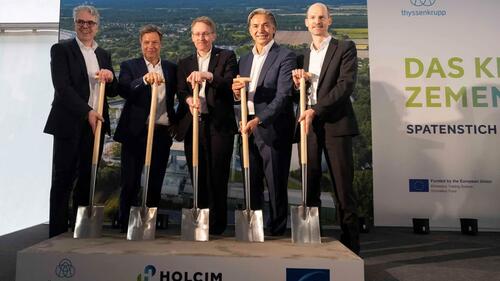Holcim's Green Vision Takes Root with thyssenkrupp Cutting-Edge “pure oxyfuel” tech: Construction Starts on the Carbon-Neutral Cement Plant in Lägerdorf, Germany
Today marked the official start of construction of one of the world’s first carbon-neutral cement plants in Lägerdorf in Schleswig-Holstein. Dr. Robert Habeck, Vice Chancellor and Federal Minister for Economic Affairs and Climate Protection, Daniel Günther, Minister President of Schleswig-Holstein, Thorsten Hahn, CEO of Holcim Germany, Dr. Cetin Nazikkol, Member of the Executive Board of thyssenkrupp Decarbon Technologies, and Andreas X. Müller, Vice President Linde Gas Germany, attended the groundbreaking ceremony. thyssenkrupp is supplying the key “pure oxyfuel” technology, which enables CO2 capture, as part of this lighthouse project.
Robert Habeck, Vice Chancellor and Federal Minister for Economic Affairs, notes: “The cement industry faces a particularly huge challenge when it comes to decarbonization. The plant here in Lägerdorf demonstrates how it is possible to decarbonize production and boldly implement climate-neutral manufacturing of cement and concrete. The fact that carbon dioxide can not only be captured but also reused as a raw material is a prime example of the green transformation.”
Daniel Günther, Minister President of Schleswig-Holstein, states: “Today we are launching another innovative German industrial project. The prototype for decarbonization of the cement industry is being built on an industrial scale in Lägerdorf. That shows once again that the future is climate-neutral. And this future begins here in Schleswig-Holstein, the number one state for the energy transition.”
Dr. Cetin Nazikkol, Chief Strategy Officer at thyssenkrupp Decarbon Technologies, states: “Cement is an indispensable building material. However, cement production is responsible for around seven percent of global carbon emissions. It’s therefore vital to switch to climate-friendly processes. By enriching CO2 by means of the ‘pure oxyfuel’ technology we’ve developed, we help our customers capture almost all of the CO2 arising in the production process and so reuse it in a sustainable manner. Given that annual global cement production is more than four billion tons, we see enormous growth potential for our innovative technology.” thyssenkrupp Decarbon Technologies has installed its equipment and provides its services at around a third of all cement plants worldwide.
Innovative CO2 enrichment process enables carbon capture
Around 830 kilograms of CO2 per ton of cement are produced in conventional cement manufacturing. In 2019, around 20 million tons of CO2 were released in cement production in Germany alone – which equates to approximately 17 percent of industrial emissions in Germany. The emissions mainly come from production of cement clinker.
The basic principle of the “pure oxyfuel” technology developed by thyssenkrupp is to separate off CO2 from the exhaust gases of cement factories in a kiln system and thus prevent it from being released into the atmosphere. To enable that, pure oxygen is used in the combustion process instead of ambient air. As a result, almost 100 percent of CO2 emissions from cement clinker production can be captured. The separated process gas is then processed into high-purity CO2 and can subsequently be used as a starting material in the chemical industry or as a raw material in other industries, or alternatively it can be stored. At the new Holcim plant in Lägerdorf, this process will be able to cut CO2 emissions by around 1.2 million tons a year. The plant is scheduled to be commissioned in 2028.
thyssenkrupp Decarbon Technologies
The “pure oxyfuel” technology has been developed by thyssenkrupp Polysius, one of four business units of thyssenkrupp Decarbon Technologies. In this segment, the Group pools key technologies and services for reducing CO2 for industrial customers. The product portfolio ranges from components and systems for the wind industry, ammonia and ammonia cracking plants, to large-scale water electrolysis technology and solutions for decarbonizing the cement industry.
The Decarbon Technologies segment is positioning itself as a technology leader for the energy transition and showcasing its credentials as a 'green industrial powerhouse’ with extensive capabilities for the green transformation. It comprises the thyssenkrupp rothe erde, thyssenkrupp nucera, thyssenkrupp Uhde and thyssenkrupp Polysius businesses. thyssenkrupp rothe erde is the world’s No. 1 supplier of the latest generation of bearings, with which it is making the energy transition possible. thyssenkrupp nucera is one of the world's leading providers of electrolysis plants for the production of green hydrogen. thyssenkrupp Uhde is a global technology leader in the ammonia value chain (including ammonia cracking), where production will increasingly be through green methods in the future. thyssenkrupp Polysius is one of the pioneers for the climate-neutral transformation of the cement industry with its green technologies, such as the patented oxyfuel technology. The businesses combine many years of experience, in-depth expertise in international plant engineering, an extensive installed base and close customer relationships. Approximately 15,000 employees work in the segment, which generated sales of around 3.4 billion euros in fiscal 2022/2023.
Categories
Countries
Latest news
Clariant's MegaMax™ 900 catalyst: Powerful start at European Energy's e-methanol plant
European Energy successfully started up their e-methanol plant in Kasso, Denmark, using Clariant’s MegaMax 900 catalyst. The Power-to-X plant is one of the world’s first and currently largest comme...
Kazakhstan’s largest petrochemical project: first piles driven for polyethylene plant in Atyrau
The construction of the plant, which has a capacity of 1.25 million tons of polyethylene per year and an investment of approximately 7 billion US dollars, is expected to be completed by 2028, with ...
Vynova Alkoxides GmbH awards first basic engineering contract for new alcoholates plant at the Lülsdorf site in Germany.
Vynova starts the construction of a new alcoholates plant at the Chemiepark Lülsdorf. A contract for basic engineering has been awarded to an external engineering company for finalising the basic d...
Norway: TotalEnergies and partners launch the 2nd phase of Northern Lights CCS project
Northern Lights will increase its CO2 storage capacity to more than 5 Mt per year. Northern Lights signed a commercial agreement with Stockholm Exergi for transport and storage of 900 kt CO2/y, fro...
